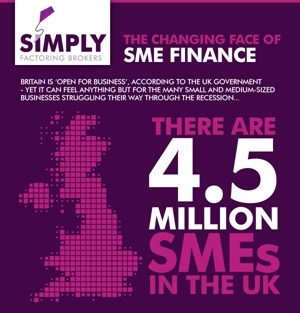Britain is ‘open for business’, according to the UK government – yet it can feel anything but for the many small and medium-sized businesses struggling their way through the recession.
The borrowing options available to SMEs have changed dramatically since the start of the economic downturn. The collapse of several leading banks means there are fewer lenders, and those that remain are far more cautious than they used to be. As a result, SMEs – viewed as riskier investments than larger companies as they have fewer assets and less security – are either rejected for loans in the first place or are offered smaller sums than applied for, leading to funding shortfalls in business plans.
The Small Business Survey, carried out by the Department for Business, Innovation & Skills (BIS), involves almost 12,000 small firms. It has been conducted in 2007-08, 2010 and 2012 and its findings reveal the changing face of finance for SMEs*. In 2007, 44% of small firms seeking finance applied for a bank loan, but by 2010 this figure had fallen to 40%. Overdraft applications rose from 26% of businesses seeking credit in 2007 to 35% in 2010, whilst the numbers seeking invoice factoring, although proportionately small, doubled from one to two percent in the same period. In 2007, there were no recorded small firms asking for loans or equity from family or business, yet in 2010 this accounted for three percent of those applying for finance. And the number of businesses applying for a Government guaranteed loan fell from three percent of those seeking finance in 2007 to two percent in 2010.
Most businesses are still able to obtain the finance they need, but it has become harder to do so since the onset of the recession. In 2007-08, 90% of SME employers who sought finance were successful, while eight per cent were unable to obtain any form of funding (the remaining two per cent answered ‘don’t know’). By 2010, the percentage of SME employers seeking funding successfully had dropped to 74%, whilst 21% were refused finance (again, the remainder answered ‘don’t know’). 
The figures become more telling when we look at the findings relating to businesses’ firstsource of funding**. In 2007-08, 25.9% of businesses that applied for finance were turned down by their first source. In 2010 that figure had more than doubled to 52.2% and, although it then fell slightly, in 2012 it still stood at 48.8%.
Small businesses are vital for the economy, particularly local economies. Government figures show that at the start of 2011 there were 4.5m SMEs in the UK, accounting for 99.9% of businesses. According to the Federation of Small Businesses, for every £1 spent on an SME, 63p goes back into the local economy. In comparison, only 40p of every £1 spent on a larger firm is spent locally. If small firms are unable to expand and develop, their communities feel the knock-on effect.
But it is not all bad news for small companies. Although finance can be harder to come by, it became largely cheaper during the recession. Due to the fall in the Bank of England’s interest rates, average interest rates on variable rate lending stood at 3.5% in November 2011 – down from 5.39% in November 2008***. And although business owners might be more wary of approaching their bank manager, innovative firms can take advantage of emerging and growing finance options such as invoice factoring and crowd funding.
The Government has promised to help business get back on its feet, introducing a new Employment Allowance to reduce National Insurance contributions (NICs) and creating the Business Bank to raise awareness of all finance options. From next year, 450,000 small businesses won’t have to pay any employer NICs, and corporation tax will drop to 20% by 2015.
If you are looking for an alternative to traditional forms of business credit, get in touch withSimply Factoring Brokers on 029 2086 3213 to see if invoice factoring is right for you.
*BIS: SME Access to External Finance
** Big Innovation Centre: Credit and the Crisis – Access to Finance for Innovative Small Firms
***BIS: SME Access to External Finance

